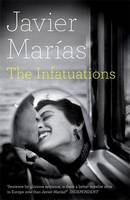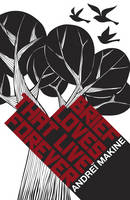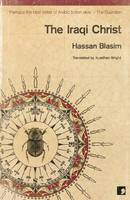Javier Marías, The Infatuations (2012)
Translated from the Spanish by Margaret Jull Costa
Andreȉ Makine, Brief Loves that Live Forever (2011)
Translated from the French by Geoffrey Strachan (2013)
My first IFFP titles are both by veteran authors whom I’m reading here for the first time.
 Javier Marías’ The Infatuations is narrated by one María Dolz, who takes breakfast at the same café as an attractive couple who are clearly very much in love; though she doesn’t speak to them, María enjoys being in the same place as them, feels her life is brightened by the simple fact of their happiness. All this is disrupted when the couple stop appearing at the café, and María discovers that the man, a businessman named Miguel Desvern (or Deverne – his family changed their name for their film distribution business; nothing settles into stable certainty here) was murdered. When María later sees the woman of the couple return to the café alone, she introduces herself; she and the woman – Luisa – become fast friends, then María gets to know Javier Díaz-Varela, a museum???friend of Luisa’s. As María becomes more attracted to Díaz-Varela, she has to face not just that he has feelings for Luisa, but that she might not know him at all as well as thinks.
Javier Marías’ The Infatuations is narrated by one María Dolz, who takes breakfast at the same café as an attractive couple who are clearly very much in love; though she doesn’t speak to them, María enjoys being in the same place as them, feels her life is brightened by the simple fact of their happiness. All this is disrupted when the couple stop appearing at the café, and María discovers that the man, a businessman named Miguel Desvern (or Deverne – his family changed their name for their film distribution business; nothing settles into stable certainty here) was murdered. When María later sees the woman of the couple return to the café alone, she introduces herself; she and the woman – Luisa – become fast friends, then María gets to know Javier Díaz-Varela, a museum???friend of Luisa’s. As María becomes more attracted to Díaz-Varela, she has to face not just that he has feelings for Luisa, but that she might not know him at all as well as thinks.
Perhaps Marías’ key concern in The Infatuations is the gap between what can be thought and what can be known. At the start, María watches Luisa and Miguel from afar; she wonders who they might be, though of course she can’t know. Then she tries to imagine what Miguel might have thought before he died, and realises she can’t know that either. The novel is full of its characters’ second-guessing others’ thought processes, or recalling their own thoughts to such a degree of detail that the very amount of information causes us to doubt its truth. The more you think, Marías seems to say, the less you can really know.
But this uncertainty is not confined to thoughts; when Marías’ characters engage in lengthy, discursive speeches, we see that the author’s techniques are distorting the reality of his novel as well, when his characters engage in lengthy, discursive speeches. This creates an interesting contrast between content and style: at the centre of the novel is an act of extreme violence, but the text that surrounds it – that mediates and tries to make sense of it – is still and reflective. In the end, perhaps reflection is all we have; as one character remarks, even the darkest of life’s events will eventually recede and become memories. It is the distinct texture Marías creates from layers of subjectivity (and Margaret Jull Costa has done a superb job of conveying this texture through her translation) that makes The Infatuations for me.
***
 ‘The fatal mistake that we make is looking for a paradise that endures,’ says the unnamed narrator of Andreȉ Makine’s Brief Loves that Live Forever, pointing towards the central theme of this novel: that the things which last in life are actually the fleeting moments, the memories and experiences. Makine (a Russian author who writes in French) guides us through key moments in his protagonist’s life, when the narrator experienced a transitory instance of love, which has nonetheless stayed with him: seeing a girl run into the arms of the grandmother she’s never met, for example; or a summer affair by the Black Sea.
‘The fatal mistake that we make is looking for a paradise that endures,’ says the unnamed narrator of Andreȉ Makine’s Brief Loves that Live Forever, pointing towards the central theme of this novel: that the things which last in life are actually the fleeting moments, the memories and experiences. Makine (a Russian author who writes in French) guides us through key moments in his protagonist’s life, when the narrator experienced a transitory instance of love, which has nonetheless stayed with him: seeing a girl run into the arms of the grandmother she’s never met, for example; or a summer affair by the Black Sea.
Alongside this are glimpses of Brezhnev’s Soviet Union, often represented by structures which are ignored or decaying (or both): the grandstand for a parade, which is soon emptied; an factory bearing a slogan that claims permanence but goes unnoticed; perhaps most striking of all, a giant orchard that was intended to make a statement, but not to be harvested. These structures may pass into ruin, but the emotions experienced in their shadow remain.
The interplay between these two aspects lies at the heart of Makine’s novel, and leaves its mark on our narrator: though he sees flaws in the Soviet project, he has not entirely discarded it by the time of perestroika; but it’s not that he clings to the old times so much as he recognises that they have provided the context for the life he has lived Makine’s prose and Geoffrey Strachan’s translation are elegant, and the novel’s reflections on love and history insightful; all adds up to a fine short novel.
***
What about these books as contenders for the IFFP? They strike me as well-made mid- to late-career novels, but not as the kind of major work that I’d want to see winning an award like the IFFP. I admired, enjoyed, and would recommend both books; but, at the same time, I suspect they are not the best that their respective authors have written. So I could see either of these novels making the shortlist, but I’d hope for more from a potential winner.
This post is part of a series on the 2014 Independent Foreign Fiction Prize.
Like this:
Like Loading...
 We announced our shadow ‘winner‘ on Wednesday, and last night the actual 2014 Independent Foreign Fiction Prize was awarded to The Iraqi Christ by Hassan Blasim, translated from the Arabic by Jonathan Wright and published by Comma Press. Blasim is an interesting writer whose short stories combine the fantastical and macabre with the realities of life in post-war Iraq; I didn’t get chance to review The Iraqi Christ myself, but I have previously reviewed his first collection, The Madman of Freedom Square, which I liked very much.
We announced our shadow ‘winner‘ on Wednesday, and last night the actual 2014 Independent Foreign Fiction Prize was awarded to The Iraqi Christ by Hassan Blasim, translated from the Arabic by Jonathan Wright and published by Comma Press. Blasim is an interesting writer whose short stories combine the fantastical and macabre with the realities of life in post-war Iraq; I didn’t get chance to review The Iraqi Christ myself, but I have previously reviewed his first collection, The Madman of Freedom Square, which I liked very much.


Recent Comments